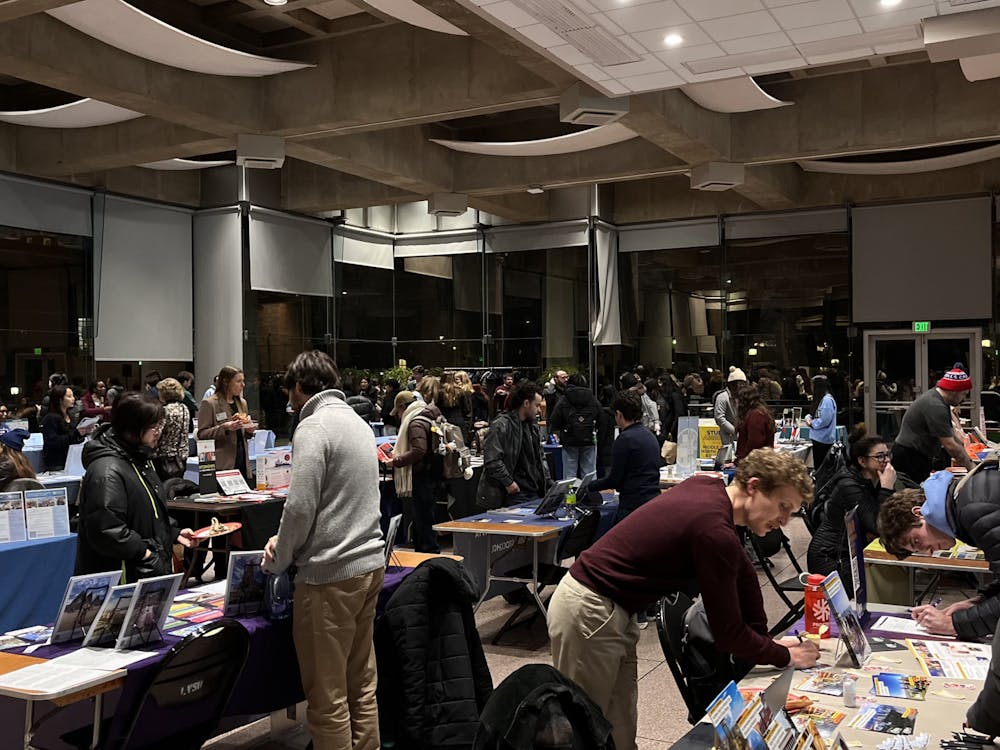The Bloomberg School of Public Health hosted the Summit on Reducing Gun Violence in America on Jan. 14 and 15 in response to the Dec. 14 shooting at Sandy Hook Elementary School in Newtown, Conn.
The Sandy Hook incident, and other recent mass shootings, have catapulted the country into a renewed debate about effective gun control strategies.
“This is the straw that has broken the camel’s back,” Michael Bloomberg, Mayor of New York City and keynote speaker at the Summit said.
Popular proposals from advocacy groups and lawmakers have included limiting magazine capacities, reinstating the 1994 assault weapons ban, mandating universal background checks and closing other loopholes in existing gun regulations among many others.
Gun policy experts from around the country and the world came to discuss policy proposals.
The backgrounds of those invited ranged from a former agent with the Bureau of Alcohol, Tobacco, Firearms and Explosives (ATF) to physicians and professors.
Daniel Webster, the summit organizer and director of the Center for Gun Policy and Research at the Bloomberg School, said that no one he contacted to speak declined an invitation.
Bloomberg began his address with a specific discussion of proposals necessary to effectively control gun use in the country and to prevent further tragedies like those in Newtown, Oak Creek, Aurora, Tucson, Fort Hood, Columbine and others.
“Enough is enough,” Bloomberg said, citing the fact that 48,000 people will die from gun violence
during President Obama’s second term if further actions are not taken. “It’s time for Congress and the White House to put public health above special interest politics.”
Bloomberg laid out a seven-pronged proposal for how to change the country’s gun policy, further detailed in a report released the same day by Mayors Against Illegal Guns, a coalition co-founded by Bloomberg in 2006. He suggested mandating universal background checks for all gun sales, including those that are private, and pressed Congress to change the punishment for gun trafficking to a federal crime. He also proposed a limit on assault weapons and high capacity magazines.
Beyond these measures, Bloomberg advocated four executive actions that Obama could take without congressional approval. First, he argued for federal agencies to be required to report all significant information to the National Instant Criminal Background Check System (NICS) so that the database remains up-to-date and effective.
Second, Bloomberg recommended stronger enforcement from the Department of Justice. He explained the deficiencies in the Justice Department’s prosecution of criminals who lie on background checks to purchase guns. In 2010, only 44 out of 76,000 of these cases went to trial.
Third, Bloomberg suggested the recess appointment of a director for the ATF, a position that has been vacant for six years.
“Can you imagine how much outrage there would be if we’d been without a Homeland Security Secretary for six years...You can’t have an agency without somebody running it that’s going do the job that it was created for,” Bloomberg said.
Finally, he called on the President to end his support for the Tiahrt Amendment, which restricts the public release of information on criminals using or selling illegal guns. He also advocated for an end to the restrictions on Center for Disease Control and National Institute of Health research surrounding gun violence. Bloomberg cited the importance of the Hopkins motto: “The truth shall set you free.”
Bloomberg urged members in the audience to call upon Congress, even if they are in support of gun policy reform, because they may be able to influence those who stand in the way.
The Summit placed an emphasis on the idea that gun violence can be prevented, as the United States is not actually prone to more violence, in comparison with other high-income countries.
“We’re not more violent, but when we’re violent, we kill,” Matthew Miller, participant and Deputy Director of the Harvard Injury Control Research Center, said.
Maryland Governor Martin O’Malley, who introduced Bloomberg, discussed some of the concerns specific to Maryland that would be proposed during the January legislative session.
“Neither Mayor Bloomberg nor any of us in Maryland are seeking to ban all guns. At the same time, we know that it makes absolutely no sense when you look at the level of carnage on our streets from guns to blame every factor but guns,” O’Malley said.
The comprehensive issues up for debate in Maryland include an assault weapons ban, magazine capacity limitations, revised licensing requirements, an enhancement of mental health services and an examination of school safety policies. Additionally, a Maryland Center for School Safety will be created.
University President Ronald J. Daniels also acknowledged the toll of gun violence locally.
“It is also important to note where we are gathering. In the past year alone, there were more than 2,700 gun related crimes in Baltimore. Sadly, this is a place where gun violence is not a surprising event, but in far too many quarters of our city, a tragic and all too commonplace part of life,” Daniels said.
The reach of the conference and the proposals discussed did not stop at the end of day two. On Jan. 25, the Johns Hopkins University Press released Reducing Gun Violence in America, with chapters authored by every Summit participant and a foreword by Bloomberg.
The concluding chapter outlines the consensus recommendations of all the participants, presented in a press conference at the end of the second day of the Summit.
“This book will constitute a state-of-the-art sourcebook for policy makers grappling with the policy options needed to respond effectively to gun violence,” Daniels said. “By the end of the month, we are committed to seeing a copy of the book on the desks of each and every member of Congress and of appropriate officials in the executive branch. That is no small feat.”
Though some in attendance bemoaned the common fears that the gun control debate will seep back into the woodwork, most were optimistic about the power of the collective group of proposals.
“Perhaps there is no way to completely prevent the next Newtown tragedy, but then again, perhaps there is,” O’Malley said, concluding his speech.




